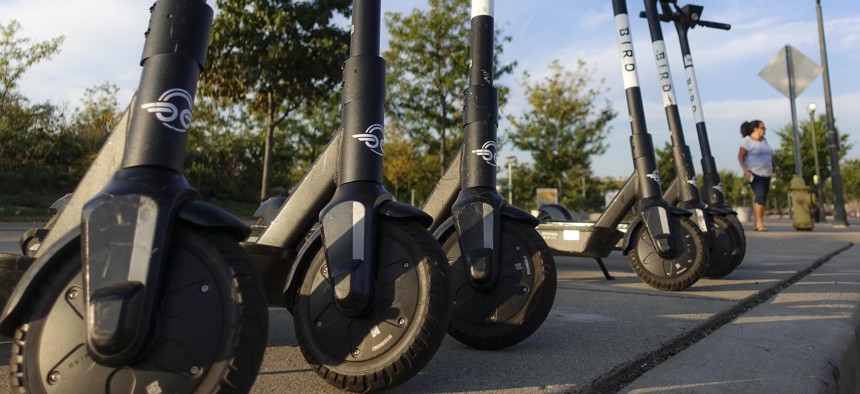Scooter Company Wants to Boost Helmet Use With ‘Selfie’ Incentive Program

Sharable electric scooters by Bird Rides, Inc. wait on downtown sidewalks for pedestrian use, Wednesday, Oct. 2, 2019, in downtown Cincinnati. (AP Photo/John Minchillo)

Connecting state and local government leaders
The move comes amid ongoing concerns about rider injuries.
Electric scooter company Bird Rides Inc. is launching a new safety program, offering riders credits and other incentives if they take a photo of themselves wearing a helmet.
The company says it’s looking to work with cities on the initiative, which is now underway as a pilot program in Washington, D.C. Bird’s “Helmet Selfie” program will initially roll out in cities that request it, a company spokesperson said Wednesday.
With the program, riders would photograph themselves wearing a helmet in the Bird app after a trip. The company plans to use “computer vision technology” to verify who's wearing headgear, and promises to dole out credits and other perks to those riders.
Bird already has a program where they offer to send customers a free helmet, for just the $9.99 cost of shipping, but says it hasn’t resulted in a major uptick in helmet use.
The scooter giant has raised hundreds of millions of dollars in venture capital over the past couple years and is currently valued at around $2.5 billion. While the scooters that Bird and other companies rent are popular, crashes and injuries are a concern.
During a four-month scooter pilot program last year in Portland, Oregon, people took about 700,000 trips, covering around 800,000 miles. The health department in surrounding Multnomah County reported 176 scooter-related emergency room visits over the course of the pilot, up from just 16 during the same period the prior year.
Scooter crashes during Portland’s pilot program accounted for about 5% of total emergency room visits resulting from traffic crash injuries.
A study in Austin, Texas, meanwhile, identified 190 confirmed and probable cases where riders were injured in scooter wrecks between Sept. 5 and Nov. 30 last year. Nearly half of these riders sustained some type of injury to their head, but only one was wearing a helmet.
Bird itself says that it has reports indicating that its riders experience one injury for every 26,881 miles ridden.
The company suggests that street upgrades, and particularly bike lanes that are separated from traffic, along with smoother pavement, would help to improve rider safety.
In taking that position, they’re to some degree aligning themselves with cycling advocates who have lobbied for similar infrastructure for years with varying degrees of success. Calling for bike lane upgrades also gets into the sometimes contentious topic of how limited state and local infrastructure dollars are divvied up between priorities.
Paul Steely White, director of safety policy and advocacy at Bird, said in a statement that ongoing discussions with city officials, safety experts and researchers helped lead to the new selfie program.
“While the most effective way to reduce safety incidents is to improve infrastructure,” he added, “we also want to help improve adoption around helmet usage."
The Bird spokesperson didn’t respond directly to a question about whether the company would share the helmet use data it collects from the selfie program with cities.
The spokesperson instead referenced the D.C. pilot, and said related research is underway at the University of California, Los Angeles and added “we hope to have data from these tests to share soon.”
Cities interested in taking part in the Helmet Selfie program should email Bird at city@bird.co, the company says.
Bird’s helmet push comes as the National Transportation Safety Board earlier this month moved to recommend that states adopt mandatory helmet laws for bicyclists.
Bill Lucia is a Senior Reporter for Route Fifty and is based in Olympia, Washington.

NEXT STORY: Could JEDI lose its momentum?





